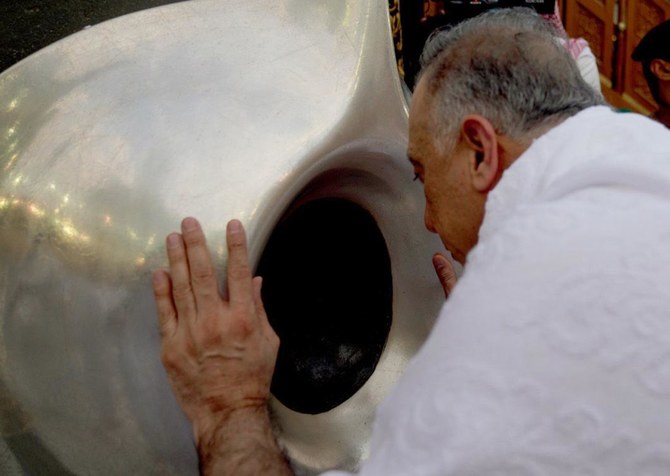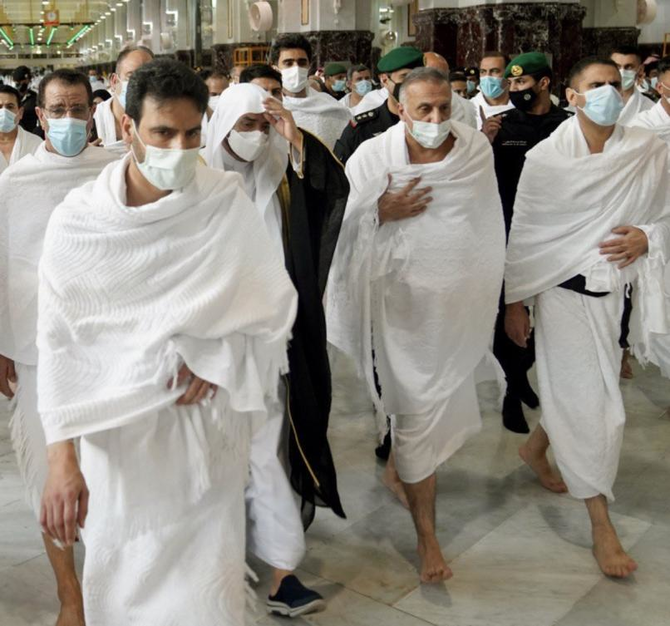BEIRUT: Gen. Rudolph Haykal, commander of Lebanon’s Armed Forces, briefed a weekly Cabinet meeting on Thursday about the security situation along the border and the ongoing implementation of the UN Security Council resolution.
In the meeting at the Presidential Palace, he reported that since last November’s ceasefire agreement, army units south of the Litani River had carried out 5,500 weapons confiscation operations — 3,000 independently and 2,500 in cooperation with UNIFIL forces.
Three days ago, a Lebanese soldier was killed and three others were injured while conducting an engineering sweep in a Hezbollah tunnel in the Wadi Al-Azziyeh area of Tyre.
The Cabinet, chaired by Prime Minister Nawaf Salam and in the presence of President Joseph Aoun, used the meeting to discuss what has been implemented south of the Litani River in line with UN Resolution 1701.
It also approved the renewal of UNIFIL’s mandate in this area.
The Cabinet identified 2,740 Israeli offences since the ceasefire agreement went into force between Hezbollah and Israel.
Aoun informed the Cabinet that his meeting in Doha with the Qatari Emir Sheikh Tamim bin Hamad bin Khalifa Al-Thani, was “excellent.”
Aoun confirmed that “Qatar is set to renew its donation to support the salaries of the Lebanese army with an amount of $60 million, along with 162 military vehicles, to enable it to carry out its national duties of maintaining stability and securing borders across all Lebanese territories.”
Lebanese Information Minister Paul Morcos said on Thursday at a press conference after the Cabinet meeting that the army commander presented a summary of the situation and heightened security measures carried out by the Lebanese army.
Morcos said that the army commander spoke of significant challenges regarding the army’s capabilities, noting that “repeated Israeli aggressions hinder the army’s deployment.”
He added: “We were briefed on how the army destroys some of the confiscated ammunition, especially since there are technical standards for carrying out this process.
“The army will continue to carry out its duties fully, but it needs support, particularly in light of the security and military challenges caused by Israel.”
Marcos quoted Salam, who emphasized “the necessity to complete judicial appointments as soon as possible,” and that “the judicial independence law will be added to the next meeting's agenda.”
Salam updated ministers on his recent meeting with Syrian President Ahmad Al-Sharaa in Damascus, where they discussed control of the Lebanese-Syrian border, strategies to combat smuggling, the cases of missing individuals in Syrian prisons, and a request for information regarding the Beirut Port explosion.
Salam also asked Al-Sharaa about the extradition of those responsible for the mosque bombings in Tripoli and the assassination of Druze leader Kamal Jumblatt.
Industry Minister Joe Issa El-Khoury said after the Cabinet session that ministers from the Lebanese Forces party proposed establishing a timeline for the handover of illegal weapons, Lebanese and non-Lebanese, within six months.
They suggested that the process could start with the Palestinian refugee camps.
In 2006, the UN Security Council adopted Resolution 1701 to end hostilities between Hezbollah and Israel.
The resolution called for the withdrawal of weapons from south of the Litani River and the deployment of the Lebanese army in coordination with UNIFIL.
The war between Israel and Hezbollah reignited in October 2023.
It escalated into a ground war in September 2024, resulting in more than 4,000 deaths and about 17,000 injuries, along with the Israeli occupation of five strategic hills in the south and the displacement of 90,000 people from the border area.
According to Army Command data, the total number of Lebanese army casualties during the recent war was 43 soldiers, including 18 killed at their posts and 24 killed in their homes or en route to them.
Coinciding with the Cabinet session, Hezbollah MP Hassan Fadlallah said that Lebanon “is still living under continuous Israeli aggression, resulting in martyrs and injuries.”
Fadlallah said his organization has accepted the full authority of the Lebanese state through its institutions, primarily the army, in areas south of the Litani, and that Hezbollah cooperated and coordinated with the army on security measures.
He maintained that “Israel violates all commitments” while “political decisions restrict the army from fulfilling its duty to protect Lebanese citizens and territory.”
The Hezbollah MP said that “stopping aggression, liberating territory and prisoners, and reconstruction must come first” before discussing defense strategies.
He said: “Only when these issues are resolved and the state fully takes on its responsibilities — when our people are no longer harmed, our land is no longer occupied, and our homes are no longer in ruins — can we address other concerns.”
He said that Hezbollah “remains open to dialogue with those who recognize Israel as an enemy and prioritize Lebanese sovereignty over external demands.”
During the Cabinet session, Israeli reconnaissance aircraft were reported in Lebanese airspace over Beirut.
Simultaneously, military drones struck a motorcyclist near the border town of Aitaroun, killing Ali Abdulnabi Hijazi.
Israeli forces also reportedly fired upon Council for South Lebanon assessment teams surveying damage in Mays Al-Jabal, although no casualties were reported.
Israeli military spokesman Avichay Adraee said that operations against Hezbollah’s efforts to rebuild capabilities or establish military positions under civilian cover will continue.
He said that Hezbollah exploited civilian infrastructure for military purposes and used Lebanese residents as human shields.






























